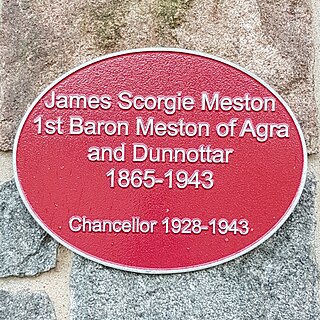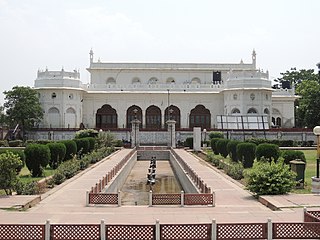
The United Provinces of Agra and Oudh was a province of India under the British Raj, which existed from 22 March 1902 to 1937; the official name was shortened by the Government of India Act 1935 to United Provinces (UP), by which the province had been commonly known, and by which name it was also a province of independent India until 1950.

Antony Patrick MacDonnell, 1st Baron MacDonnell,, known as Sir Antony MacDonnell between 1893 and 1908, was an Irish civil servant, much involved in the Indian land reform and famine relief in India. He was Permanent Under-Secretary to the Lord Lieutenant of Ireland (1902–1908); Member of the Council of India (1902); Privy Councillor (1902); Lieutenant-Governor of the United Provinces of Agra and Oudh (1895–1901); Lieutenant-Governor of Bengal (1893–1895); Chief Commissioner of the Central Provinces (1890–1893); Chief Commissioner of Burma (1889–1890); Home Secretary to the Central Government of India (1886–1889); Secretary to the Government of Bengal and the Bengal Legislative Council.

Sir John Strachey was a British civil servant and writer in India who served as Lieutenant-Governor of the North-Western Provinces from 1874 to 1876. He was briefly acting Governor-General in February 1872, before being replaced by the more appropriate Lord Napier who acted for the remainder of time until Lord Northbrook arrived.

The North-Western Provinces was an administrative region in British India. The North-Western Provinces were established in 1836, through merging the administrative divisions of the Ceded and Conquered Provinces. In 1858, the Nawab-ruled kingdom of Oudh was annexed and merged with the North-Western Provinces to form the renamed North-Western Provinces and Oudh. In 1902, this province was reorganized to form the United Provinces of Agra and Oudh. Allahabad served as its capital from 1858, when it also became the capital of India for a day.

Sir Auckland Colvin (1838–1908) was a colonial administrator in India and Egypt, born into the Anglo-Indian Colvin family. He was comptroller general in Egypt (1880–2), and financial adviser to the Khedive (1883–87). From 1883–92 he was back in India, first as financial member of council, and then as Lieutenant-governor of the North-West Provinces and Oudh. He founded Colvin Taluqdars' College in Lucknow.

Sir Spencer Harcourt Butler was an officer of the Indian Civil Service who was the leading British official in Burma for much of his career, serving as Lieutenant-Governor and later Governor of Burma (1923–27).

James Scorgie Meston, 1st Baron Meston, was a prominent British civil servant, financial expert and businessman. He served as Lieutenant-Governor of the United Provinces of Agra and Oudh from 1912 to 1918.
Sir John Woodburn was an Indian Civil Servant, who later served as Lieutenant Governor of Bengal from 1898 to 1902.

The Safed Baradari, is a white marbled building in Lucknow Uttar Pradesh, India.
The King's Birthday Honours 1901 were announced 9 November 1901, the birthday of the new monarch Edward VII. The list included appointments to various orders and honours of the United Kingdom and British India.
The New Year Honours 1910 were appointments by King Edward VII to various orders and honours to reward and highlight good works by members of the British Empire. They were announced on 4 January 1910.
The New Year Honours 1909 were appointments by King Edward VII to various orders and honours to reward and highlight good works by members of the British Empire. They were announced on 5 January 1909.

Sir Charles Montgomery Rivaz was a colonial administrator in British India, and Lieutenant-Governor of the Punjab 1902-1907.
The 1892 Birthday Honours were appointments by Queen Victoria to various orders and honours to reward and highlight good works by citizens of the British Empire. The appointments were made to celebrate the official birthday of The Queen, and were published in the London Gazette on 24 May 1892 and in The Times on 25 May 1892.
The 1896 New Year Honours were appointments by Queen Victoria to various orders and honours to reward and highlight good works by members of the British Empire. They were published on 1 January 1896.
The New Year Honours 1907 were appointments by Edward VII to various orders and honours to reward and highlight good works by members of the British Empire. They were published on 1 January 1907.
The 1911 Delhi Durbar was held in December 1911 following the coronation in London in June of that year of King George V and Queen Mary. The King and Queen travelled to Delhi for the Durbar. For the occasion, the statutory limits of the membership of the Order of the Star of India and the Order of the Indian Empire were increased and many appointments were made to these and other orders. These honours were published in a supplement to the London Gazette dated 8 December 1911.








